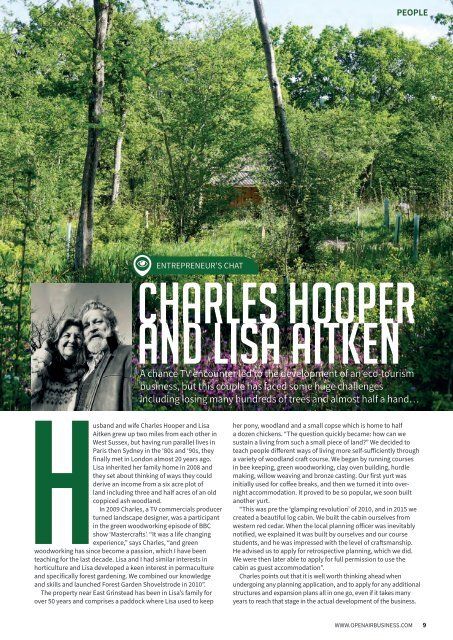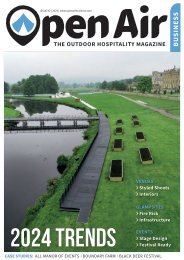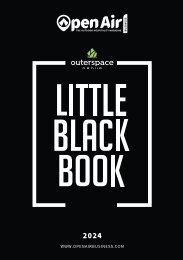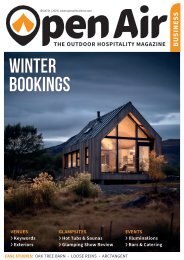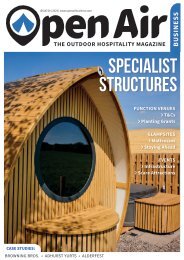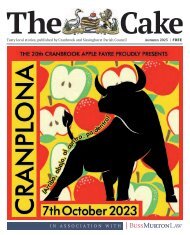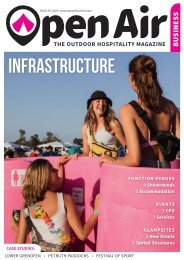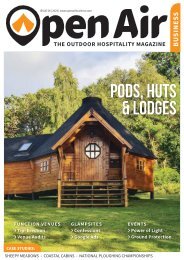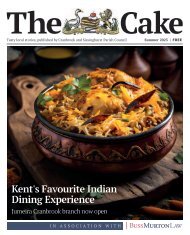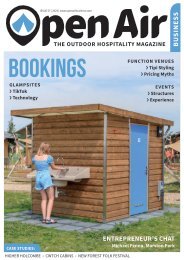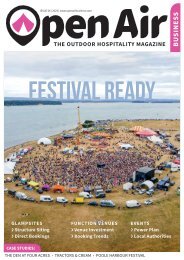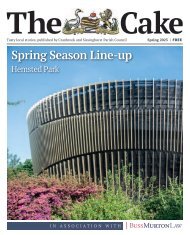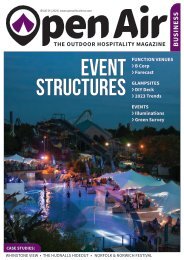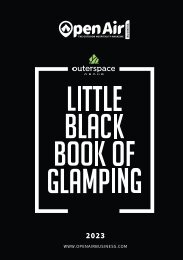Issue 50
The UK's outdoor hospitality business magazine for function venues, glamping, festivals and outdoor events
The UK's outdoor hospitality business magazine for function venues, glamping, festivals and outdoor events
You also want an ePaper? Increase the reach of your titles
YUMPU automatically turns print PDFs into web optimized ePapers that Google loves.
PEOPLE<br />
ENTREPRENEUR’S CHAT<br />
CHARLES HOOPER<br />
AND LISA AITKEN<br />
A chance TV encounter led to the development of an eco-tourism<br />
business, but this couple has faced some huge challenges<br />
including losing many hundreds of trees and almost half a hand…<br />
usband and wife Charles Hooper and Lisa<br />
Aitken grew up two miles from each other in<br />
West Sussex, but having run parallel lives in<br />
Paris then Sydney in the ‘80s and ‘90s, they<br />
finally met in London almost 20 years ago.<br />
Lisa inherited her family home in 2008 and<br />
they set about thinking of ways they could<br />
derive an income from a six acre plot of<br />
land including three and half acres of an old<br />
coppiced ash woodland.<br />
In 2009 Charles, a TV commercials producer<br />
turned landscape designer, was a participant<br />
in the green woodworking episode of BBC<br />
show ‘Mastercrafts’. “It was a life changing<br />
experience,” says Charles, “and green<br />
woodworking has since become a passion, which I have been<br />
teaching for the last decade. Lisa and I had similar interests in<br />
horticulture and Lisa developed a keen interest in permaculture<br />
and specifically forest gardening. We combined our knowledge<br />
and skills and launched Forest Garden Shovelstrode in 2010”.<br />
The property near East Grinstead has been in Lisa’s family for<br />
over <strong>50</strong> years and comprises a paddock where Lisa used to keep<br />
her pony, woodland and a small copse which is home to half<br />
a dozen chickens. “The question quickly became: how can we<br />
sustain a living from such a small piece of land?” We decided to<br />
teach people different ways of living more self-sufficiently through<br />
a variety of woodland craft course. We began by running courses<br />
in bee keeping, green woodworking, clay oven building, hurdle<br />
making, willow weaving and bronze casting. Our first yurt was<br />
initially used for coffee breaks, and then we turned it into overnight<br />
accommodation. It proved to be so popular, we soon built<br />
another yurt.<br />
“This was pre the ‘glamping revolution’ of 2010, and in 2015 we<br />
created a beautiful log cabin. We built the cabin ourselves from<br />
western red cedar. When the local planning officer was inevitably<br />
notified, we explained it was built by ourselves and our course<br />
students, and he was impressed with the level of craftsmanship.<br />
He advised us to apply for retrospective planning, which we did.<br />
We were then later able to apply for full permission to use the<br />
cabin as guest accommodation”.<br />
Charles points out that it is well worth thinking ahead when<br />
undergoing any planning application, and to apply for any additional<br />
structures and expansion plans all in one go, even if it takes many<br />
years to reach that stage in the actual development of the business.<br />
WWW.OPENAIRBUSINESS.COM 9


